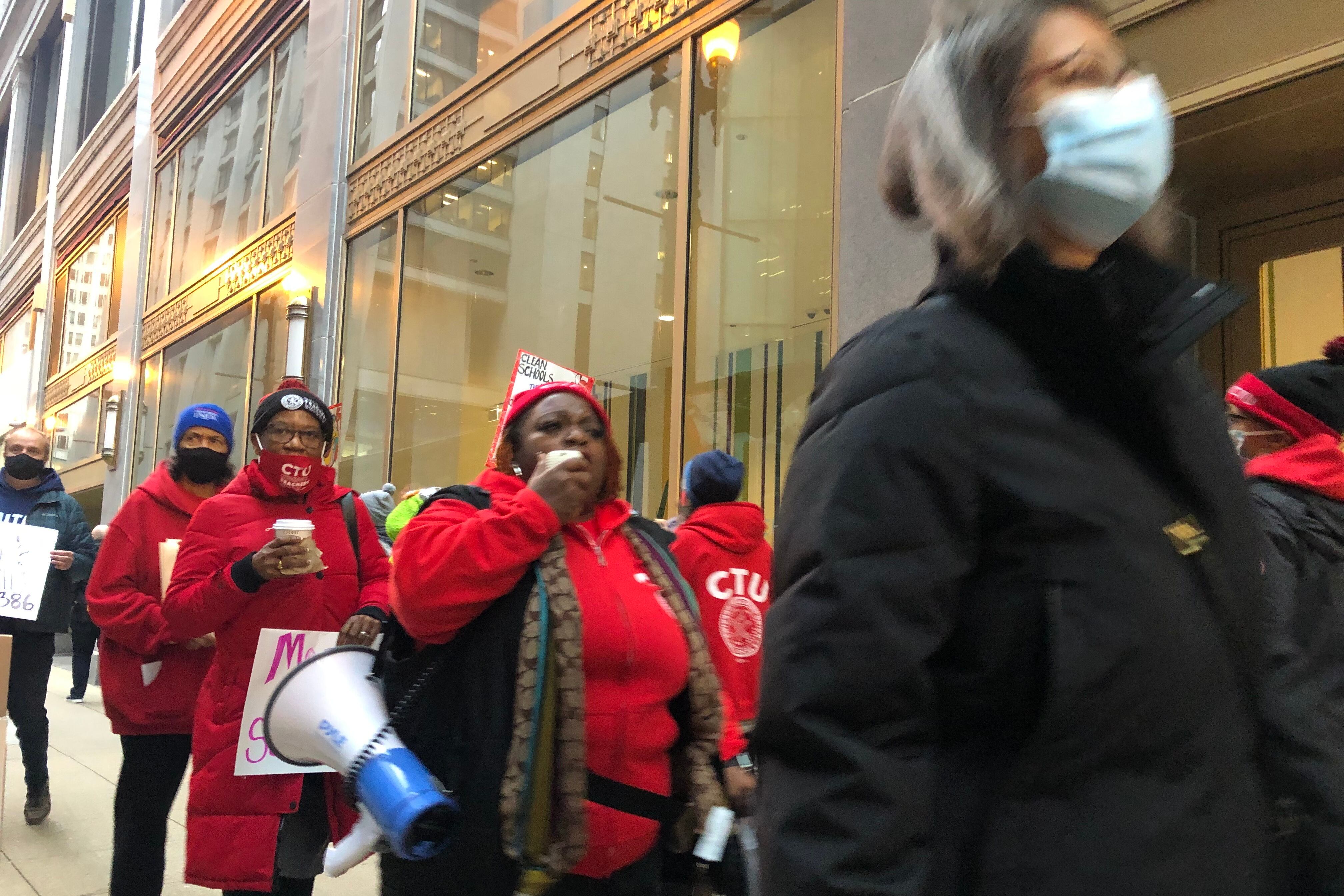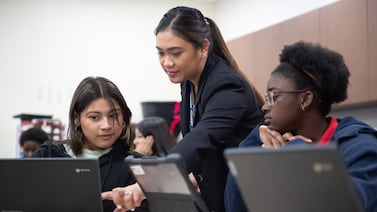Mandate COVID vaccines. Hire more parents. Electrify all school buses. These are just a few of the proposals the Chicago Teachers Union is putting forward in a sweeping policy paper released today.
The document – “From Pandemic to a Real Path Forward” – is the third version of a policy brief first issued by the union in 2012. That paper – “The Schools Chicago’s Students Deserve” – was a first-of-its-kind move from a then-newly elected union leadership team led by the late Karen Lewis and became a roadmap for the union to move beyond bargaining over pay and benefits to advocating for broader political issues, such as affordable housing and violence prevention.
Now, as Chicago Public Schools continues its recovery from the pandemic that upended education and exacerbated pre-existing disparities for Black and Latino students, the union is calling on the district to make long-term investments by fully staffing schools, offering robust art programs, eliminating student-based budgeting, and more. Read the full report here.
“Short-term fixes for ‘recovery’ are not enough to mitigate both the harm of the pandemic and the harm of decades of segregation and disinvestment,” union leaders and some members wrote in the report. “Instead, the path forward requires a long-term commitment to students’ real needs, done in a way that recognizes the fundamental humanity of all students, not just those who happen to live in a select few zip codes.”
Here are some of the highlights from the report:
Require COVID vaccine mandate, other mitigation
In the face of emerging COVID variants, the union is recommending students, staff, families, and visitors entering any school building be vaccinated and boosted, if eligible. The union cited vaccination requirements for other deadly diseases as a reason to implement the requirement for the COVID-19 vaccine. The union also called for masking indoors and randomized testing unless students opt out.
The district has struggled to get students vaccinated. Across all district-run schools, the average school vaccination rate is 39.6%, a drop from May when the average school rate was 44.7%.
Majority Black elementary and high schools had an average vaccination rate of 23%, compared to majority Latino elementary and high schools, which averaged about 48.5%, according to a Chalkbeat analysis.
Address student mental health
School districts across the country are grappling with how to deal with the mental health fallout from the pandemic. The Centers for Disease and Control Prevention released a survey in the spring that found 1 in 3 high school students experienced poor mental health during the pandemic. About 44% of students nationwide also reported feeling “persistently sad or hopeless,” according to the survey.
Chicago students have also had to contend with the impact of gun violence. Last year, more than 50 school-aged children were shot and killed and hundreds more were wounded, according to the Chicago Sun-Times. Since January, 42 people 17 and younger have been shot and killed this year.
Chicago Public Schools must create school-based mental health clinics staffed by clinicians to address the multiple traumas, the report recommends. School disciplinary policies should be “trauma-informed and supportive,” the union writes.
The union’s recommendations also include: staffing each school with enough social workers and counselors to meet professional standards, training these clinicians in trauma-informed care, and staffing schools with restorative justice coordinators.
The district should also partner with community-based groups already providing mental health services, according to the union.
Put electric school buses and solar panels at every school
Chicago Public Schools has over $3 billion in deferred maintenance of buildings, some of which are nearly 150 years old. In the report, the union calls for long-range planning to prioritize capital improvements to campuses and building maintenance.
The union calls on the district to incorporate green building initiatives such as expanding solar panels to all school buildings and to train students in solar technology as part of an expansion of a solar manufacturing career technical education program. The CTE program could help train students to build and install solar panels at every school, according to the union’s vision.
Beyond the classroom, the union is also calling on the district to use clean energy by adopting a fleet of electric school buses. Funding for electric school buses could come from the recently passed bipartisan federal infrastructure bill and Illinois’s new climate and equitable jobs act.
The electric fleet, the union says, would help reduce carbon emission and reduce health consequences associated with diesel pollution.
Guarantee every school a librarian, nurse, counselor, and technology coordinator
The union’s initial policy paper in 2012 demanded CPS increase the number of counselors, nurses, social workers, and psychologists. This was a key issue – and win – during the latest round of bargaining in 2019. Building off the district’s agreement to ensure every school has one social worker and one nurse, the union is adding positions it deems essential: librarians and technology coordinators.
The goal, the union says, is to provide more individualized support to every student.
Key to guaranteeing every school has these positions, the union says, is funding them centrally, not from school budgets and regardless of enrollment. This is how district officials currently fund principals, for example.
Convert vacant schools to mental health clinics and affordable housing
There are dozens of vacant, boarded-up former schools across Chicago, most of them shuttered in 2013. The district put several up for sale and some were purchased by nonprofits, private schools, or developers, who converted them to luxury apartments.
But the majority remain vacant.
The union puts forward two ideas for reuse: Reopen mental health clinics shuttered by former Mayor Rahm Emanuel or turn them into affordable housing. At least one of the vacant school buildings – the former Von Humboldt school – was sold with the understanding it would become affordable housing for teachers. The project has stalled several times, but appears to be moving forward again.
Becky Vevea is the bureau chief for Chalkbeat Chicago. Contact Becky at bvevea@chalkbeat.org.
Mauricio Peña is a reporter for Chalkbeat Chicago, covering K-12 schools. Contact Mauricio at mpena@chalkbeat.org.






